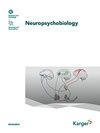女性精神分裂症患者月经周期相关变化:静息状态fMRI研究
IF 3.1
4区 心理学
Q3 NEUROSCIENCES
引用次数: 2
摘要
卵巢激素对精神分裂症(SCZ)的不同影响已经有报道,但迄今为止还没有研究评估它们对静止时大脑动力学的影响。本研究旨在探讨与月经周期相关的激素和临床变化,以及静息状态功能连接(RS-FC)随月经周期和/或激素波动的变化。方法:本研究采用受试者间和受试者内实验设计,纳入13例临床稳定的女性SCZ患者(32±7.7岁)和13例健康女性(30±7.3岁)。rs功能磁共振成像(fMRI)扫描,以及激素和临床评估,应用于每个参与者两次在两个周期阶段:卵泡早期和黄体中期。结果:两组间黄体中期黄体酮水平存在差异,且效应量较大(Cohen’s d)为0.8 (p < 0.05)。雌二醇水平与黄体中期患者阴性症状严重程度呈负相关。在患者中,雌激素与卵泡早期左杏仁核听觉网络连通性呈正相关。在对照组中,黄体酮与卵泡期早期双侧楔前叶后默认模式和左侧额顶网络的连通性呈正相关,与黄体中期执行控制网络的连通性呈负相关。结论:本研究显示各组间激素水平存在差异,提示周期依赖性激素水平可能与各组临床症状严重程度及RS-FC变化有关。我们的RS-fMRI结果值得进一步研究。本文章由计算机程序翻译,如有差异,请以英文原文为准。
Menstrual Cycle-Related Changes in Women with Schizophrenia: A Resting-State fMRI Study
Introduction: Different influences of ovarian hormones in schizophrenia (SCZ) have been reported, but no study to date has assessed their effects on the brain dynamics at rest. The present study aimed to examine the hormonal and clinical changes related to the menstrual cycle and alterations in the resting-state functional connectivity (RS-FC) depending on cycle phase and/or hormonal fluctuations in SCZ. Method: This study was conducted based on both between- and within-subject experimental designs, including 13 clinically stable female patients with SCZ (32 ± 7.7 years) and 13 healthy women (30 ± 7.3 years). RS-functional magnetic resonance imaging (fMRI) scanning, as well as hormonal and clinical assessments, was applied to each participant twice during two cycle phases: early follicular and mid-luteal. Results: A difference in mid-luteal progesterone levels was found between groups, with a large effect size (Cohen’s d) of 0.8 (p < 0.05). Also, the estradiol levels negatively correlated with the negative symptom severity of the patients during their mid-luteal phase. In the patients, estrogen positively correlated with the auditory network connectivity in the left amygdala during the early follicular phase. In the controls, progesterone had positive correlations with the connectivity of the posterior default mode and the left frontoparietal networks in the bilateral precuneus during the early follicular phase and had a negative correlation with the executive control network connectivity in the mid-luteal phase. Conclusion: The present study showed hormonal differences between groups and suggested that the levels of cycle-dependent hormones might be associated with the changes in clinical symptom severity and the RS-FC in the groups. Our RS-fMRI findings warrant further investigation.
求助全文
通过发布文献求助,成功后即可免费获取论文全文。
去求助
来源期刊

Neuropsychobiology
医学-精神病学
CiteScore
7.20
自引率
0.00%
发文量
26
审稿时长
6 months
期刊介绍:
The biological approach to mental disorders continues to yield innovative findings of clinical importance, particularly if methodologies are combined. This journal collects high quality empirical studies from various experimental and clinical approaches in the fields of Biological Psychiatry, Biological Psychology and Neuropsychology. It features original, clinical and basic research in the fields of neurophysiology and functional imaging, neuropharmacology and neurochemistry, neuroendocrinology and neuroimmunology, genetics and their relationships with normal psychology and psychopathology. In addition, the reader will find studies on animal models of mental disorders and therapeutic interventions, and pharmacoelectroencephalographic studies. Regular reviews report new methodologic approaches, and selected case reports provide hints for future research. ''Neuropsychobiology'' is a complete record of strategies and methodologies employed to study the biological basis of mental functions including their interactions with psychological and social factors.
 求助内容:
求助内容: 应助结果提醒方式:
应助结果提醒方式:


